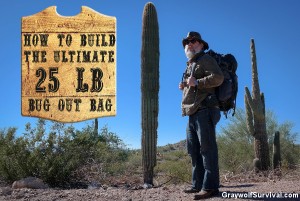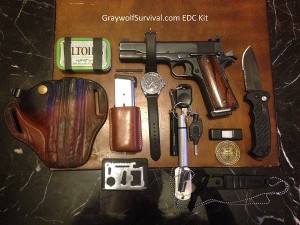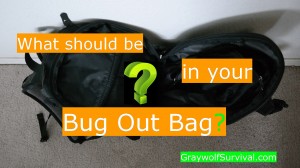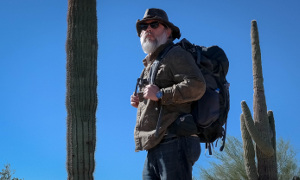 So I was going through my facebook, Pinterest, and google+ pages today when an old Army buddy of mine called, whom I haven’t spoken with since before Afghanistan. Mikey had been reading through my posts for the past while and was interested in a lot of the things I had to say on my site. This surprised me a bit because I didn’t know Mikey could read.
So I was going through my facebook, Pinterest, and google+ pages today when an old Army buddy of mine called, whom I haven’t spoken with since before Afghanistan. Mikey had been reading through my posts for the past while and was interested in a lot of the things I had to say on my site. This surprised me a bit because I didn’t know Mikey could read.
We got around to talking about quite a few things about prepping. Mikey likes to talk so he’s great for ideas. Plus, he’s got a lot more tactical training and experience than I do, and he’s fun to be around, so he’s on my list of people I’d let on my bug-out island if SHTF.
We got on the subject of my ‘Why a .22 may be the best home defense weapon’ article, which led to how he used to think the biggest, fastest bullet was the best but had his mind changed by a SWAT instructor friend of ours, which led to teaching people how to shoot what they’re comfortable, which led to parallels with preppers usually thinking a HMMWV or somesuch nonsense is the best SHTF vehicle, which led to over-prepping and how people get so worked up with buying thousands of rounds of ammo but don’t have 5 gallons of water, which led to the difficulty in defending non-discreet or very effective preps, which led to the subject of working with others. Whew! There were several other subjects we talked about but they don’t have anything to do with this article. Funny how a conversation can take weird turns dozends of times when you’re comfortable with whom you’re talking.
Prepping is planning. If you’re planning what to do if you find yourself in a SHTF or WROL (Without Rule of Law) scenario, you have to consider security as one of the pillars of your bug in or bugout planning. I’ve had people ask how a family of four can adequately defend themselves against gangs or organized bands of looters like the ones experienced after hurricane Katrina.
As Mikey agreed, the plain and simple fact is that they can’t. It doesn’t matter if you’re defending yourself with a shotgun or a bazooka, one or two people just aren’t going to be able to hold off 20 armed guys who are determined to get what you have in any normal situation. I’d be hard pressed to think of a scenario that would be an exception but it would probably involve a castle and an island. And a dragon.
So, is it all a waste of time to prep? Of course not. You just have to be smart about it. Proper OPSEC (Operations Security) before and during an emergency or TEOTWAWKI (The End Of The World As We Know It) event is critical because if the gangs don’t think you have anything worth risking their lives or time with, then you probably won’t have to deal with them. Of course, OPSEC is very difficult to do right, and you have to balance it with other things like having better equipment and having a life.
OPSEC is extremely important, but you don’t have to be invisible and xenophobic either. If you’re looking to survive a long-term dystopian environment, the only real way to do it is to band together – seriously, you do. Of course, this is also easier said than done. For one thing, it’s difficult to recruit people to work together if you don’t tell anyone about your plans, which is a fundamental part of OPSEC. More about that later.
Humans started banding together to survive millions of years ago. They did this for one thing: because there’s safety in numbers. If you live by yourself, you can’t collect food, improve your fighting position, patrol the area, chop wood, filter water, and be on all sides of your property – all at once. Plus, you have to devote a large amount of your day to sleeping each night. And besides, who are you gonna bitch to about your day if you’re all alone?
If you plan on bugging out to a remote location somewhere after SHTF, you have to understand that you won’t be the only one who’s gonna have the same idea. Granted, preppers (even if they don’t know they’re preppers) will be out there first but others will soon start leaving the metropolitan centers for the hills to not only get away from any gangs but also for food and water, which would be in short supply if the power goes out. If you have a nice little homestead set up with solar power, water, food stores, guns and ammo – a prepper’s paradise – you’re gonna be a target if anyone runs across your land. Taking a cabin from two people wouldn’t require a tactical genius.
Even a small group of 12 has a HUGE advantage to defending an area and continuing on with other operations at the same time. With an adequate number of personnel, not only can you have a rotation of assignments to support 24 hour operations, you can afford people to specialize in certain tasks. This specialization increases the efficiency of the group overall (synergy) and was one of the largest reasons why we developed into a society. If you have enough people, you could, for example, have a fishing guy, a tactical guy and a repair guy. As these guys do their job(s) day-to-day, they’ll get better and better at it. With enough people, you could more easily support your basic needs and then you could devote some time to actually enjoying life and even relaxing on occasion.
The problem is that if you wait until a large-scale catastrophic event to start recruiting, you’ll be at a serious disadvantage. Whether you find yourself stuck in the middle of a city full of gangs, or wandering through the forest because your bugout vehicle broke down 10 miles into your 300-mile bugout route, or you just got evicted from your bugout location because 9 armed guys stormed in your back door while you were defending the front and your wife was in the back room protecting the kids, at some point you have to consider that you’ll need to work with others. At this point, it’s a bit late. Starting this process now will allow you to vet your prospective comrades and sidestep those who you don’t trust or who’d be more of a burden than a blessing.
You need to also be careful with whom you’re telling about your prepping and especially whom you trust to have access to your plans, your supplies and your family. Learn how to read people, get out amongst others, and learn about your neighbors and others. Starting now will afford you the best chance to make good decisions about which people will be best suited for your group and give you the best chance to build a solid team – and give you enough time to build that team.
What you need to do is start looking at what kind of people you’d need in whatever situation you’re planning for and figure out how to meet those people and work together. Each person in your group is one more that you have to feed, shelter and protect so you should try to be picky with whom you trust if you have the opportunity to do so. You may be stuck with family but you should try to choose the rest.
So let’s look first at some traits you need to consider.
Skills
A good survivor is good at a lot of things and is very adaptable but you can’t know or have everything. Your team should have a good balance, not only in personalities but you should also have people with some specialized knowledge if you want to give your group the best chance. Here are some specialized skills you should be looking for as well as developing on your own:
- Security – obviously, those with Army and Marine experience will be a great asset in the security part because even if they weren’t infantry, they’re all trained in the basics of combat. Other services have some training but won’t typically be as well-trained, with some exceptions.
- Some Air Force jobs such as Forward Air Controllers, Special Operations Weathermen and Para-rescue provide a LOT of tactical training and these guys have seen a lot of time behind a weapon. The Navy also has a few jobs (SEALS anyone?) that will be what to look for. Just keep in mind that just because someone was in the military does NOT mean that they have any idea how to shoot, let alone defend a facility.
- Military experience is not the only thing to look for in someone who could help with security. Police officers are not only trained with weapons and close-quarter fighting, they’re very security-consciousMartial arts instructors can also be extremely helpful but just keep in mind that you’re not going to train a 110-pound girl to be able to win a fight against a 200-pound bad guy in a short amount of time.
- Those with martial arts experience or MMA have a definite advantage over those who don’t, but training doesn’t always equate to effectiveness and doesn’t always compensate for someone else’s advantages in size, strength or speed.
- Medical – This is a key skill that you should be looking for. A lot of military people are trained in first aid so that’s helpful but a Registered Nurse, EMT, Doctor, veterinarian, or even a pharmacist could easily save your life someday.
- Mechanical – Those with mechanical abilities, especially those who are good at limping things home with scraps they find on the side of the road, are going to be very helpful in a long-term situation. Mechanical ability is something you can learn but it’s largely something you’re born with. A lot of those people have gone into jobs that are obvious such as garage mechanic but keep an open mind for people such as mechanical engineers or electricians. These guys will be able to adapt to your situation and not only fix things that break, they can improve or invent new things such as power generators and water filtration systems. A good hillbilly engineer with a prepping background is what you need.
- Technical – Technical skills kind of fall into mechanical but they can be a little different. Someone who’s good at Ham Radio will usually have electronic skills and can not only help with communications, they may be able to fix electronics such as in your vehicle or generator. Someone who can fabricate things through welding or wood/cement building also falls into this category.
- Survival – Obviously, having Les Stroud in your group would be a huge help so people with outdoor skills from hunting, military ops or training would come in handy. Consider also though that you may find yourself having to survive in a more urban environment so people with street smarts may really be the ones you’d need in certain cases.
Trustworthiness and loyalty
These are critical. I’d rather take someone I trust who has no skills and is ready to learn than someone I don’t trust who’s advanced. Your ethics can be very situationally-dependant so having people with a good moral compass will be more likely keep your best interest at heart if you’re a part of their group. Since you’re looking at doing this now, you should absolutely, positively do some kind of background checks on anyone before you start trusting them with the lives of your family and of your secrets.
View of Life
Just as with most relationships, what things you feel are important (or not important), and what side you’re on with controversial subjects should be compatible with others in your group. I wouldn’t do so well with a group of pacifists, nor would I do well in a group of ultra-religious people. Our viewpoints are just too divergent and too many problems would come up. You need to find people who think like you do.
Attitude
Attitude is also important. Most of survival is mental so having someone around who is a downer can actually be fatal in some circumstances. People who are realistically optimistic are good for the group. People like Mikey who can make people laugh are also good.
Motivation
There are two things to consider with motivation. The first is about what they value and will risk their life for. Someone who’s only out for #1 could be very bad, and even if they don’t downright betray you, they may be such a draw on the group that they aren’t worth the investment. The second is just basic everyday motivation – laziness. If a person isn’t gonna pull their weight, you’re gonna have to pull it for them. Not only is this bad for morale, it can put your whole operation in jeopardy.
So how do you start? Getting together with like-minded people is easier than ever before with the advent of the Internet. There are countless survival forums out there that you can start interacting with people to get to know them as you learn and even meetup groups in your area that you can join online.
You should also start doing some learning about Small Group Dynamics. There are certain dynamics that a group will typically go through when facing an obstacle (or a daily crapload of obstacles) that can be handled well or poorly depending on the leadership of the group. Even if you’re not the leader, you’d better damn well be an advisor. A good team can make up for a lack of skills, planning or equipment.
As I’ve mentioned, neighbors are important because they are most likely going to be your first line of defense (or first people you have to defend yourself from) if SHTF. If you don’t know your neighbors – start the process now. I hang out with several of my neighbors at least one or two weekends per month. You can learn a lot about a person through elicitating information and reading them. Once you get to know someone and believe they’re to be trusted, you can start to approach prepping topics or what to do in an emergency. Even if you’re not planning on bringing in your neighbors into your SHTF team, you need to start thinking about what you’d do if you had a natural disaster in your area, and hopefully recruit them to work together in planning your neighborhood’s security plan.
Don’t just stop at your neighbors -go out and talk to people and get to know them. Once you’ve started to get to know people, you can use those people to meet others. Even a con artist can be found out if you speak with other people because they’ve either already conned others or other people just don’t trust them so even if they don’t end up in your group, they might incidentally help you choose others. You really don’t know someone until your life is on the line but you don’t need to surround yourself with people who aren’t good to start off with. In any case, as you bring people deeper into your circle, trust – but verify.
Don’t forget that if you’ll be working with others, even just your immediate family, you need a good commo plan. You never know where you’ll be, let alone where each of your other team members (or family members) will be if an emergency hits and you can’t rely on cell phone service if it’s a regional thing. I’d suggest that every member of your team not only get your ham radio license and a ham radio for each family, but get out there and actually use them. You’re not gonna pick it up in a day and just like developing relationships, you should be starting now so you’re ready when SHTF.
So, if you want the best chance of survival, you need to bring in other people and stop thinking that you’ll just fend off the world with your AK-47. There are force multipliers out there that I’ll go over in the future that will help you be as effective as a larger group, but even those are more effective if you have a small group of people instead of just a few. Start looking at realistic scenarios and how you’re planning on dealing with them currently, and then picture what you could do with a few experienced people on your side. You’ll quickly see the advantages.
If you still want to do the lone wolf thing and go it alone, feel free. I’m sure someone will thank you for all the stuff in your cabin one day.
Want something to read next? How about:






Great article and something’s to definitely think about. One of the advantages I have right now is my girls adult kids live with us. This means trustworthy people whom we have discussed these situations with. We’ve got mechanical and electronic areas covered, security and some minor medical skills as well so it’s fairly well rounded and I’m bringing them up slowly with other skills.
When I was single I always thought I would be able to go it alone for a while but I knew that in a long term SHTF situation I would need more than just myself. The problem was always the things you outline like the over all dynamic, people’s motivations, etc. That made it difficult for me because I’m not as trusting as the average bear so inevitably my bullshit alarm would go off and I’d have to part ways with the group I was with.
Makes it tough. It’s one of the big reasons why families were so big years ago.
Exactly and it’s one of the reasons why, despite conditions being tight, we’re keen on keeping everyone in close proximity.
Graywolf, this is a good article. Well thought out and presented. It’s good that you have some of your old friends to run stuff like this by. I’ve got an old friend from the Corps that’s coming to visit this summer, but alas, he’s from California. Maybe you could do a post about having friends all over the country in case TSHTF and you’ve got to run. Just an idea. -jarhead survivor
I have a commo plan article that covers some of that – http://graywolfsurvival.com/1179/how-to-family-emergency-communication-plan/ . And thanks for your service brother. I’ve worked with a lot of Marines downrange. Love you guys.
That comm article was good. quq. I like it!
Thanks for YOUR service, bro.
Speaking of SHTF in Cali! Just think another huge Earthquake!
Also a good idea to have friends that can help you MOVE long distance in short time. Truckers can get to you quick and get you through the country quick.
And truckers know people all around the country and are familiar with lots of locations.
Thanks for the article, this is something I have been considering for some time.I have found it difficult to initiate conversation in a meaningful way, perhaps trust is not my long-suit. Anyway I enjoy your site, very informing and thought provoking, thanks again.
It can be very difficult. The more people you talk to in general, the easier it is to talk to others, and the more likely it is that you’ll run across people who are a good fit. Sometimes it’s easier to start online. Just remember to trust but verify.
Hey Joe, do you camp? Hey Mike, You hunt? Ken. you shoot? Ever try Archery? Want to join me in an advanced first aid course? It starts with people you’ve known for a while and trust and steer into conversations and try activities that are related with them and see how they act. Keep in mind that people you know, especially relatives who are not freeloaders, and are hard workers, are more prone to be invested in YOUR future and as such theirs as well than some stranger.
if you have a (prepper) group thats great but not all of us have, some of us HAVE to go it alone because there isnt anyone else we can trust.
You aren’t alone, having to go it alone. ‘I’m far from home where I want to be, and can’t get back. People here think anyone prepping is nuts. Looking on line… huh. They are all in another state. It would be great to team up with a couple of others.
Teams are cans of worms. the can be a tangled mess or the best thing in the world (for example, when you go fishing). It all depends on the situation. Trying to go it alone is no guarantee that you have the mobility you think you will gain, but the diversification of skills does you no good if you do not strive to cross train. For example, become too dependent on “doc” and lose him at the wrong time and have no one else with those vital skills, You are SOL. A good team means that you not only have trustworthy reliable people, they need to be educable, STABLE, and capable of reacting well under stress. This brings in an issue that is rarely thought of when considering teams: FAMILIES. When you bring on a team member, how do you consider spouse and offspring? What about extended family? Are extended family part of your team? This is a situation that is completely different than a military aspect where you are specifically assembled to do a job to an end goal. In OUR situation our end goal is open ended, not limited. We are intent on surviving as a whole, as a family…. so HOW does your team dynamic work in that situation? This is a lot more involved than just meeting specific job descriptions. the Psychology involved is substantial. The individual members may be able to handle the job but they are only one on four based on statistics.
Hi Graywolf; I’m an American living in Australia and keeping a close eye on the happenings in America. I don’t know how SHTF will effect us here; but due to close ties Oz had with the USA, I would expect a trickle down effect. Oz gave up their guns years ago…only folks on acreage can have registered guns at home. I want to prep with my Aussie husband and children but getting them to SEE the world the way I do has been very difficult and frustrating. Even finding preppers here would be a miracle. If it weren’t for people like you and other Americans I’d feel so alone. Any suggestions? Thank you so much! Ardella
Hi Ardella! You’re right about our close ties. I was on an Australian base for my tour in Afghanistan. They’re great people. Never heard the ‘C’ word so much in my life lol.
There are actually quite a few Aussie preppers. You can start with sites like this – http://www.preppergroups.com/?s=qld&searchsubmit=
A LOT of people camp in the bush in AUS too. Hanging out with them will teach you a lot about survival. You’ll find preppers sprinkled amongst that crowd as well.
Find a few websites like http://www.survivalistboards.com/ and post that you’re looking for like-minded preppers in QLD. Getting a ham radio license is also not only something you should be doing anyway, there are a lot of Aussies who use it and a lot of hams are preppers.
Ardella, I too am new to prepping and dont have the support of my husband,my brother has already begun collecting food. I am gathering as much information as possible because I’d rather get prepared & have nothing happen then be left with no means of anything. If you like I can give my email so we can exchange ideas etc or just encourage one another. I cant get through to my children that things could get ugly but they cant see the forest for the tree’s.Hope to chat soon Katherine.. jakoa2008@yahoo.com
Plenty of preppers in Oz, try http://ausprep.com and http://ozprepper.com. Also you can own guns in Oz even if you don’t own acres, but you have to join a gun club OR get a letter from someone who does own at least 50 acres (maybe 70, could depend on the state) stating that you are allowed to shoot on their property. Now that may be hard to get for most people but it is doable.
I’ve not tried but I assume anyone can join a gun club though, I also think you will have to attend a few times a year to at least pretend you are an active club shooter 🙂
I want a squad. Not just a squad, but more of a family. The only problem is, my location doesn’t provide people that could provide me this assurance. I live in West Virginia, full of Veterans. None of which are at the level that they should be. So my advice to everyone. Prepare yourself, if you get a squad, fine. But don’t rely on anyone but yourself..
The Goonies now that bring back memories. 🙂
Have kids, build a unit that you can trust over the years.
No kids go it alone, its every human for them selves with those going alone probably surviving the longest against most things throw at you.
Wolf pack all the way. Small unit all wolves, loyalty to a fault.
“For the strength of the pack is the wolf;
And the strength of the wolf is the pack.”
The lion hunts alone.
One of the best articles I’ve seen here (but not yet read all) or anywhere else.
Of course I differ with you on a few things. I can train a 110 pound girl to whip a 200 pound gorilla. IF I can get her to pull the trigger.
People who have been under fire have a totally different mind set from most civilians. They don’t hesitate to pull the trigger. If a bad guy, with an AK67, suddenly pops up in front of the typical civilian, he’s going to hesitate, even if for a moment. Because he can’t believe someone is going to kill him. Anyone have any ideas to overcome this? Short of sending your potential partner to Afghanistan
Muscle memory is about the only way. Train with blanks/paintballs/saying bang! etc. When you’re stressed and confused, your body will revert to your training. If you don’t have training, you’ll stand there wondering what you should be doing.
“I didn’t know Mikey could read.” I hope that cracked Mike up as much as it did me.
lol yeah. Mikey’s awesome.
This article was incredibly helpful for me. Thanks.